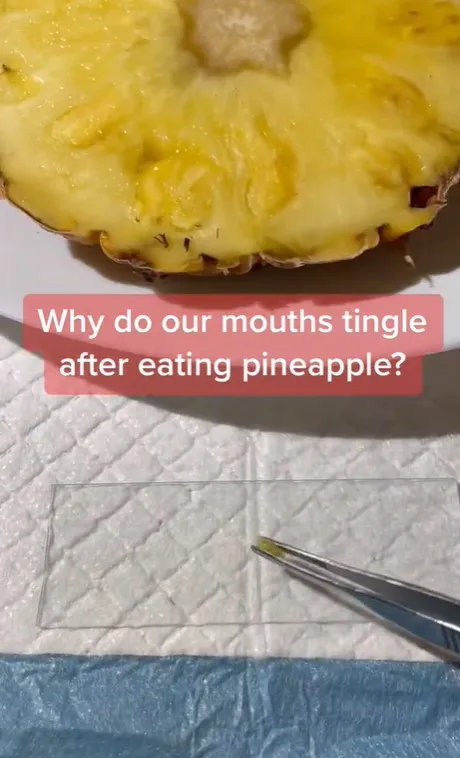Many viewers were stunned on social media after a viral video revealed the surprising science behind why your mouth tingles after eating pineapple.
On TikTok, a science-focused page explained this phenomenon, which gained significant attention among viewers.”
Many people experience an odd tingling sensation in their mouths after eating pineapple.

Whether you enjoy this tropical fruit for its flavor, health benefits, or simply because you like it, the post-pineapple tingle can be quite perplexing.
Recently, a viral TikTok video has shed light on this curious phenomenon.
This revealed an unexpected scientific explanation behind the phenomenon.
What causes the tingling sensation?
On Tiktok platform, a user, who goes by @sf_microscopy shared a video, revealing why your mouth tingles after eating pineapple.
The video has the caption:
SF Microscopy, a science-focused TikTok page, recently explained why pineapple causes this peculiar feeling.
The video, which quickly garnered widespread attention. The video revealed that the tingling sensation is due to tiny needle-like structures in the fruit known as raphides.
These microscopic crystals of calcium oxalate are responsible for the irritation you feel on your tongue and inside your mouth.

It explained: “One of my favorite fruits is pineapple, but every time I eat them, my mouth tingles. I read that the fruit contains raphides! Kiwis, grapes, taro, and yams also have large amounts of these crystals. These needles serve as a defensive function against insect herbivors to deter them from eating the plant’s fruits and protect the seeds. The needles work with other chemcial substances, like bromelain in the pineapple, to amplify the effects.”
Raphides: the culprit behind the irritation
Raphides are needle-shaped crystals found in pineapple, as well as in other plants.
“When you consume pineapple, these crystals can puncture the cell membranes in your mouth. This causes a prickly, uncomfortable feeling.

This reaction occurs because the pineapple’s raphides are designed to deter herbivores, including humans, by causing irritation upon contact.
The science of pineapple’s defense mechanism
According to McGill University, raphides are part of the pineapple’s natural defense system.
When the fruit is damaged, either by chewing or other means, these crystals are expelled into the surrounding tissue.
This triggers irritation, effectively discouraging animals from eating the plant.
In essence, pineapples have evolved their own form of defense mechanism to protect themselves from being consumed.

The video quickly went viral and sparked debate on social media.
The TikTok video explaining the pineapple tingle quickly went viral and sparked debate on social media.
In the comment selection, many viewers have been both fascinated and horrified by the revelation.
Reactions on social media range from shock to amusement.
Some users have vowed never to eat pineapple again, while others have joked about the fruit’s “fighting back” nature.
Additionally, many people shared their own experiences with pineapple-induced mouth irritation.
Common comments included references to sore mouths and even bleeding after consuming large quantities of the fruit.
One user praised the educational value of the video, expressing amazement at the pineapple’s defensive strategies.
One person said: Are kiwis like this too? My mouth always feels funny after eating them
A second wrote: This whole time I thought it was because I was mildly allergic.

While a third commented: This is why it took me way too long to figure out im actually allergic
Another added: Me an intelligent person knowing its acidic
Someone else said: It always feel so raw afterwards this makes so much sense.
Despite the discomfort, many people remain undeterred, continuing to enjoy pineapple for its taste and nutritional benefits.
While the scientific explanation behind the pineapple tingle is intriguing, it’s unlikely to deter fans of the fruit.
Pineapple remains a popular choice for its flavor and health benefits.